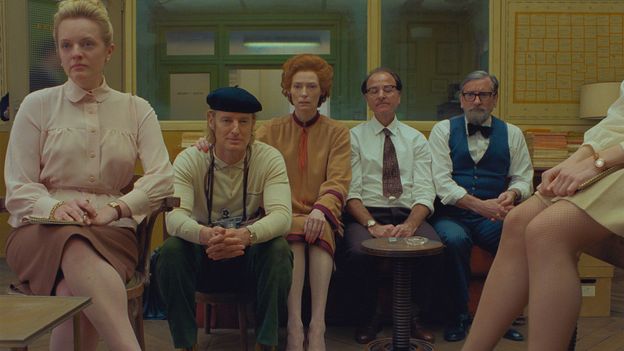The French Dispatch: A Pleasantly Overwhelming Ode to Journalism
November 5, 2021
Director: Wes Anderson
Starring: Tilda Swinton, Frances MacDormand, Jeffery Wright, Bill Murray, Benicio Del Toro, Owen Wilson, and others
Release Date: October 22, 2021
After years of being pushed back and delayed and being shown all over Europe (including a nine-minute standing ovation in Cannes), The French Dispatch finally hits native shores. The French Dispatch is the tenth film written and directed by auteur Wes Anderson. The film follows The French Dispatch, an outpost of a Kansas magazine publication in the fictional town of Ennui-sur-Blasé, France (which can be translated to English as apathy-upon-boredom). The French Dispatch is split up into one short story and 3 distinct main stories in a single issue of The French Dispatch in an anthology, omnibus type style. This is segmented by text announcing the title and its respective journalist.
The first story is “The Cycling Reporter” by Herbsaint Sazerac (Owen Wilson); a brief tour of our setting and sets the general tone of classic Anderson dry humor and abrupt slapstick. The second, “The Concrete Masterpiece” by J.K.L. Berenson(Tilda Swinton), is a story about a maximum security level prisoner/painter (Benicio Del Toro) and his guard/muse (Léa Seydoux). The third, “Revisions to a Manifesto” by Lucinda Krementz (Frances MacDormand), is about a young revolutionary(Timotheé Chalamet) and Krementz’s struggle to retain journalistic neutrality. Lastly, “The Private Dining Room of the Police Commissioner” by Roebuck Wright (Jeffery Wright) is an epic tale of an exceptional police chef and his involvement with kidnapping the Ennui police commissioner’s son.
Anderson masterfully uses the entire frame; gags happen in almost every foreground, midground, and background shot. Each shot is handcrafted with so much effort that it seeps through the screen, a feat Anderson maintains for a majority of the film. This Jacques Tati-esq level mastery of using an entire frame for multiple gags while keeping a story moving forward is a genuinely insane level of skill. Unfortunately, this skill is sometimes too overwhelming for a newcomer to the Wes Anderson style. It might even be too much for a Wes Anderson fan too. Now, it would be easy to mark that as a bad quality of the film. But the screen is filled with so much pure creativity. It is executed so well that it’s hard to say anything bad about that overwhelming quality.
Additionally, due to the anthology storytelling style, it’s difficult to get attached to characters. An insane amount of A-listers graced the screen for barely a few minutes. Sure, they all do a great job and play their roles to the best of their ability. And the stories are still quite entertaining, but a movie like this needs an emotional core to ground you in such a weird world. The first three stories are fun exercises in the full potential of what Anderson can accomplish, but with little to no actual emotional weight. It’s the final story, “The Private Dining Room of the Police Commissioner,” that is near perfect. Jeffery Wright’s performance is exceptional; he’s able to have this unspoken aura of sadness found in Steve Zissou, M. Gustave, or plenty of other of Anderson’s best characters. You genuinely believe Roebuck Wright has lived before and after the movie ends. There are even some gut-punching, emotional lines in there while still being so much fun. The section that is all a 2D animated short was absolutely thrilling and hilarious. The way it was presented was easily the best.
Anderson excels as a storyteller and an artist by creating these incredible environments where everything is so dollhouse-like. So…well, it’s so…Wes Anderson. His name has become a style within itself. But despite all that, he still manages to create tragic, broken, and eloquently written people in this picturesque world. The French Dispatch, although lacking slightly in that department, is no exception. It might not be as funny as The Grand Budapest Hotel. It may not be as emotional as The Life Aquatic with Steve Zizzou. It may not be that lighting-in-a-bottle directorial pivot like Fantastic Mr. Fox. It may not have the Scorsese level needle drops of The Darjeeling Limited or The Royal Tenenbaums. But the almost over-perfection of the signature Wes Anderson aesthetic is a sight to behold, even if it’s just a little blinding to look at. Rating: 4/5









